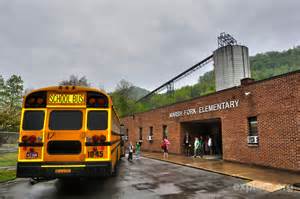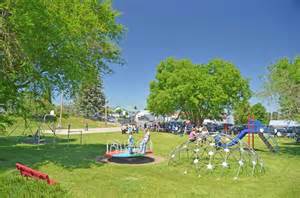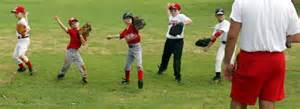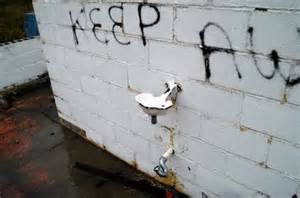Coaching Tip - Baseball Fields
Although with good intentions, teaching one coaching tip after another, sometimes removes coaches, like myself, from remembering some of the other issues we faced, and current little league coaches face.
Let’s get off the baseball diamond for a moment and face some very real Off Field Problems and how to solve them.
Good Practice Field
Makes no difference how much knowledge you have about baseball, it’s impossible to train your players without a good practice field on which to demonstrate and practice the skills they require to play.
Acquiring this field, as a lot of other things in life, seems to be a two edged sword.
(1.) If you live in a highly populated area, chances are public park baseball fields are somewhat plentiful, however you’re still in a dilemma if there are 50 fields available, but a 1000 teams vying for them.
(2.) On the flip side … if you live in a smaller community, there will be less teams to contend with, but less public park fields available. Same issue whether you live in New York city or Brown Leaf Arkansas. Let’s look at some options for you, the coach, to explore and solve your problem.

Elementary Schools and Coaching Tip
Elementary schools are a good place to practice, are more plentiful than middle or high schools and are normally centrally located to your players. Every school I’ve ever seen has at least one baseball field they use for recesses and although kick ball or soccer may be played on the field as often as baseball, it’s an excellent place to first look.
Steps to take:
Go to the school's business office during regular school hours and ask to either speak to or set an appointment to talk to the principal about reserving a field for your little league practice. Chances are you’ll have to make an appointment, but have your information with you in case you get lucky and the principal is available to meet you then.
Request to reserve a specific time on specific days and be prepared to be flexible, you may not be the first person to make such a request. Be reasonable in your request, 2 practices a week should suffice, any more and you could unintentionally paint the principal into a corner of refusing your request. Remember, the field is school property, which is taxpayer property, which is public property.
Middle and High Schools and Coaching Tip
Don’t rule out Middle and High Schools as a resource, as they all will have one to several practice fields for their sports teams, but usually there will only be one of each in a town, as opposed to several elementary schools.
You’ll be more likely to encounter scheduling problems because they will have student activities (such as baseball games) scheduled, however it’s still a good idea to check it out as weekends or off days may be available to secure field time. Like it or not you may have to create your schedule around other peoples’ schedules.
Churches and Coaching Tip
Churches, more than likely, will be more plentiful than elementary schools and nearly all have a baseball field, especially ones which provide a daycare service and are required to provide daily exercise programs.
It’s a good idea to take the time to find out if any of your players’ parents are members of the church, which could give you an inside track to securing field time. Name dropping works at church just like it does in business.

Coaching Tip - Churches With Day Care
City Parks
As mentioned early on city or community parks are another source of baseball fields, as they are usually well maintained and provide adequate parking. There is no set of rules governing city parks, but if it is the city‘s policy, most cities allow, some may require, reserving baseball fields for particular times. The city’s park’s department is the first place to find out how to reserve a field and should there not be a park’s department, go to the city hall. They’ll either be able to help you or guide you to someone who can help.
Little League Park and Coaching Tip
Some baseball leagues own their baseball fields and will assign practice times to their teams. Although this is better than nothing, you’ll be at the mercy of either the “Draw” or the “Field Coordinator” as to when and how long you are allotted field time. An 8:00 a.m. practice on a Saturday morning is practically worthless.

Desperate Times and Coaching Tip
You’ve played by the rules and are still unable to secure a decent practice field…. It’s time to become creative.
There are many parks, playgrounds, etc. which rely on the “First Come … First Served” principle, which means the first to arrive and claim the field has it for that time period. The issue is getting there first.
Deciding which field would offer the best opportunity for success, have your Team Coordinator canvas your players’ parents to see if anyone would be available to get to the field early to reserve it for that day.
If you’re lucky a parent may be coming home from work at that time and wouldn’t mind stopping and holding the field, or a stay at home Mom or Dad may be flexible enough to get to the field early.
Whatever means deemed necessary, you must have a way to secure a practice field with an infield. To try and teach infield baseball techniques without an infield is like teaching someone to swim while in the middle of the Sahara desert. Possible...but Not very likely.
Plan B
Should circumstances, your early bird did not show and someone else got to the field first, you can’t cancel practice because there isn’t time to notify everyone. That’s when you implement plan B and still hold a productive and learning baseball practice. Some suggestions are:
(1.) Spread your team out and hit fly balls to them. All players need to learn to catch fly balls whether they consider themselves an outfielder or not.
(2.) Hold batting practice. This is where rubber lay down bases come in handy as you can lay out a field with them. You’ll have to assign 1 or 2 foul ball chasers to retrieve balls the backstop would have normally stopped, but it’s not impossible to do.
(3.) Practice Rundowns or long toss to strengthen arms.

Coaching Tip - Develop Throwing Arms
Visitor Ball Parks and Coaching Tip
Let’s fast-forward through spring training and are embarking on our first game of the season.
The trend, whether looking for better competition, or numbers of players are inadequate to play an in-home game schedule, is for more and more baseball leagues to turn into a travel league, which requires teams to compete with teams in neighboring communities.
If you’re new to this system, the first thing you must realize is Youth baseball ball parks are always going to be different, as the wealthy leagues may have a grand complex complete with several concession stands, restrooms close to each field and water fountains inside the dugouts, while other leagues play at city ball parks which have the bare necessities.
Therefore, there are some non-negotiable rules you must follow to avoid non-baseball related problems.
(1.) Always have a full jug of ice water & paper cups located inside the dugout, the kind of yellow or orange water jugs you see along construction sites.
(a.) Remember, you’re playing a Summer sport and it’s hot and dehydration, besides posing a severe health risk, will sap the energy out of your players. It really doesn’t matter if you know for sure the ball park has water fountains located in the dugouts or not, Take the Water Anyway.
(b.) Although water fountains are available, they may be broken or not turned on yet if it’s early spring, and think about it, have you ever got cold drink of water from any water fountain, much alone one located outside.

Coaching Tip - What!! Worked Last Time
2.) Unless you’re experienced and have visited every baseball complex belonging to the "traveling” association, you & your players, may not be familiar as to where the parks are located.
You will need to have easily understood maps drawn and distributed to the parents at the first team meeting, and be sure to list your & any coaches, cell phone number in case of someone getting lost. Believe me … it happens.
(a.) After game scheduling, but before practices begin you need to drive to each and every ball park yourself. You may be quite surprised how many of the baseball complexes are off the beaten path, either due to zoning or the cost factor of owning such a large parcel of ground in the middle of a commercially zoned area.
(b.) Visit each park even if you know where you think it’s located. There’s always the possibly the association has built a different complex or a natural event, such as a flood, has forced the park to be moved to another location. Much better safe than sorry.
(c.) Fight your instinct to use Map quest, google or some other mapping or GPS devises or sites. Instead of Ballwin, Missouri … you may end up in Ballwin, Kansas and these maps have not proved infallible. You’re the coach, as such you’re suppose to know certain things and where your team is suppose to play and how to get there qualifies as one of those things. To suffer a forfeit because the team couldn’t find the park is an embarrassment you don’t want to endure.
Coaching Tip to Coaching Youth Baseball

New! Comments
Have your say about what you just read! Leave me a comment in the box below.